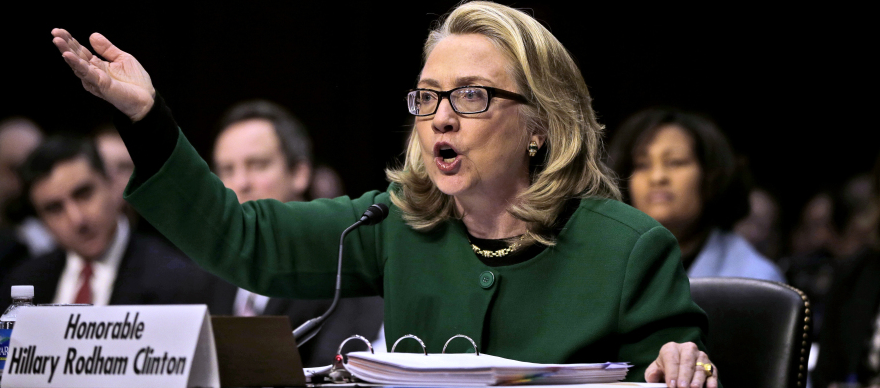(In January, Hillary Clinton gave testimony on the attacks on a U.S. Consulate in Benghazi, Libya, in which four Americans died. Republican Senator Jim Inhofe described the former secretary of state as having a “forceful attitude” that he wasn’t accustomed to hearing from women.)
Some Republicans would like us to believe Benghazi is another Watergate. President Barack Obama and former Secretary of State Hillary Clinton betrayed their oaths of office, they say, and were more concerned with politics than with rescuing besieged personnel at a diplomatic outpost.
A new poll by Public Policy Polling suggests that all this effort to whip up scandal over the attacks on the U.S. embassy in Libya, in which four American diplomats were killed, is not paying off. Instead, the controversy is ending where it began — as a niche issue for listeners of AM talk radio who already believed it’s another Watergate even if they can’t quite place Benghazi on the map.
The attacks on Clinton stem from anxieties about a country in which a particular type of white masculinity is in peril.
Yet the GOP leadership is persisting with this fetish. Why?
One, Republicans want to repair their reputation as the party of national security. Two, Benghazi is a chance to take aim at Clinton before her presumed run in the 2016 election.
But beneath all this is something uglier, something far more destructive.
They are using Benghazi to undermine the legitimacy of America’s first black president.
Note the pattern. Obama is not an American citizen, certainly not “natural born.” He’s a closet “Muslim” who “hates” white people and attended an “anti-white” church while being mentored by “domestic terrorists.” Mitt Romney’s utterly failed election strategy was to mobilize white voters with appeals to racial tribalism and identity politics. He used a mix of dog whistles and overt racial signals to suggest that Obama is a type of political “Other” not to be trusted as president.
Attacks on Clinton originate from similar anxieties, only these are about a country in which a particular type of white masculinity is in peril. In a mirror of the racially tinged attacks on Obama by the right-wing media, Clinton has been described as “angry” and “not knowing her place.”
In January hearings on Benghazi, Senator James Inhofe of Oklahoma channeled this crude sexism when he said: “I think that [Clinton] has gotten by with that type of a forceful attitude, something that’s not normally accustomed — that you don’t hear from women as much as you do men.” Clinton is no stranger to such assaults. In the 1990s, conservatives accused her and her husband of committing murder in a long-forgotten scandal that was once known as Whitewater.
As we saw during the 2008 and 2012 presidential elections, contemporary populist conservatism is nothing if not an exercise in protecting white male privilege vis-a-vis appeals to white victimhood polarizing rhetoric such as “real America” and “taking our country back.”
There has been a retreat from a critical engagement with how inequalities of race and gender impact social policy and the Good Society.
In this context, a black president and a female secretary of state are potent symbols that arouse hostility and anxiety among many Republicans, especially the Tea Party base of the GOP.
In post-civil rights era America, there has been a retreat from a constructive and critical engagement with how inequalities of race and gender impact social policy and the Good Society.
Moreover, the ethic of “colorblindness” has been reimagined to mean that those who dare discuss systemic, personal, or institutional examples of white racism are maligned as “the real racists.”
This strategy has born fruit: Despite all the available evidence of how racism and racial inequality continues to negatively impact the life chances of people of color, public opinion surveys reveal a significant percentage of white Americans feel “oppressed” and believe that “racism” against white people is a bigger social problem than discrimination against racial minorities.
The Benghazi scandal is the union of two very powerful forces in the age of Obama.
The first, what social scientists have termed “symbolic racism,” is a type of white racial animus that views people of color, and blacks in particular, as not worthy of trust or full citizenship. The second is how movement conservatism’s war on women’s reproductive rights, equality, and freedom is predicated on the idea that men are naturally dominant and women naturally subordinate.
A black president and a female secretary of state cannot be reconciled within such a worldview.
Conservatives will predictably respond in a shrill manner to such a suggestion. Yet given the ways in which racism and sexism are dominant landmarks on the cognitive map of contemporary right-wing politics, the synergy of those two social forces are over-determining the Republican Party’s hostility.
The manufactured Benghazi scandal is a perfect storm for a Republican Party wherein racism and sexism are synonymous with contemporary conservatism.
Chauncey DeVega is an essayist, cultural critic, and host of “The Chauncey DeVega Show” podcast.



0 Comments